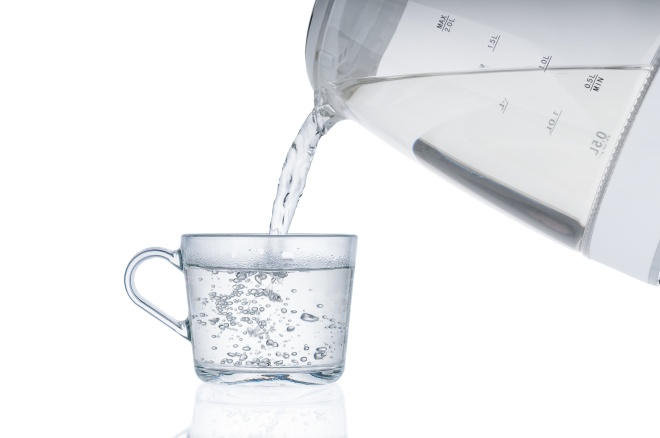
You don’t have to be Erin Brockovitch to know that bad water is really bad for you.
(Good) water has so many health benefits that the U.S. Centers for Disease Control & Prevention (CDC) recommends drinking eight 8-ounce glasses of water every day. Tea can often be included in that total since tea is basically just leaves steeped in (hopefully) good water. Water is essential, and the human body is, after all, 70% water. We can survive a month or so without food but no more than a week without water. And, I know I can’t survive a day without good tea.
I talk all the time about “good tea” and my commitment to sourcing and blending it is the foundation of Pearl Fine Teas. I won’t sell anything I myself wouldn’t drink. There may be a tea or two that I personally just don’t care for, but every single tea on our menu is of the highest quality I can afford to source. If you start with really good tea, you have to have really good water in order to make a really good cuppa. See how that works? There is just no way of getting around it and why would you want to?
I hear from many of my clients and customers that they often use the hot water spout in the office or heat up a mug in the microwave. My response to that is always: Yikes!
I also hear that when they have a cup of tea brewed by us at area farmers markets, they say the tea tastes better than what they make/drink at home. That’s in part to the water filtration system I use (see below). I had ours calibrated to deal with DC water and take out the stuff that makes things icky and taste awful. There is virtually no smell or weird taste to our water. It goes through a 3-chamber system and does a great job filtering and helping our tea taste really, really good. Below is some information on what water type/quality does to your beloved cuppa:
TYPES OF WATER FOR MAKING TEA
- Distilled water: Distilled water is too soft (low in minerals) and will brew into flat-tasting tea. Avoid.
- Spring water: Optimal for tea, but some types are better than others. The best spring water for tea should be neutral in pH (about 7) and in flavor.
- Sparkling water: Not advised for making tea. Of course if you want to spike your bubbles with already made tea to flavor the water, you can certainly give it a try.
- Well water: With any pH above 7, it’s best to filter before brewing to prevent the unwanted flavor of extra minerals. Well water poses a special problem for tea brewing because its pH is almost always above 7. Test your well water. If it’s above about 8.5, it is hard water and it will brew a bitter tea.
- Microwaved water: A big No-No for tea making. Tea needs oxygen from the water for the flavor to come out and microwaved water is devoid of that leading to a rather awful tasting and lifeless cup of tea that will taste flat and weird. Avoid.
- Filtered Tap Water: Depending on the city you live in, filtered tap water could be just fine for making tea. There are many counter top filtration systems that can be purchased to take out some of the things your city might put into the water to keep it “clean”.
- RO / Reverse Osmosis: Also not recommended unless the water is remineralized. The tea will also taste flat and lifeless.
Some types of filtration systems for home use include the following and you can click on each one to read up on their offerings to see if it might be the right fit for you, your budget and your tea:
According to the CDC: “…the top causes of disease outbreaks related to drinking water are Giardia intestinalis, hepatitis A, norovirus, and Shigella. Bad as that sounds, it’s far from a complete list. There are also health risks related to water contaminated with organic and inorganic matter, other bacteria and viruses and other pollutants. Some studies link high levels of lead in drinking water to delays in physical and mental development, short attention spans, and learning difficulties in children. There’s also evidence that arsenic in drinking water can lead to nerve, heart, skin, and blood vessel damage. And Cryptosporidium is responsible for potentially life-threatening diarrhea.”
Water and health are as interdependent as good water and good tea. So take care, filter your water, try not to use the microwave (buy a kettle), use good tea leaves and enjoy a great cuppa!
Happy Sipping!
~The Chief Leaf

You must be logged in to post a comment.